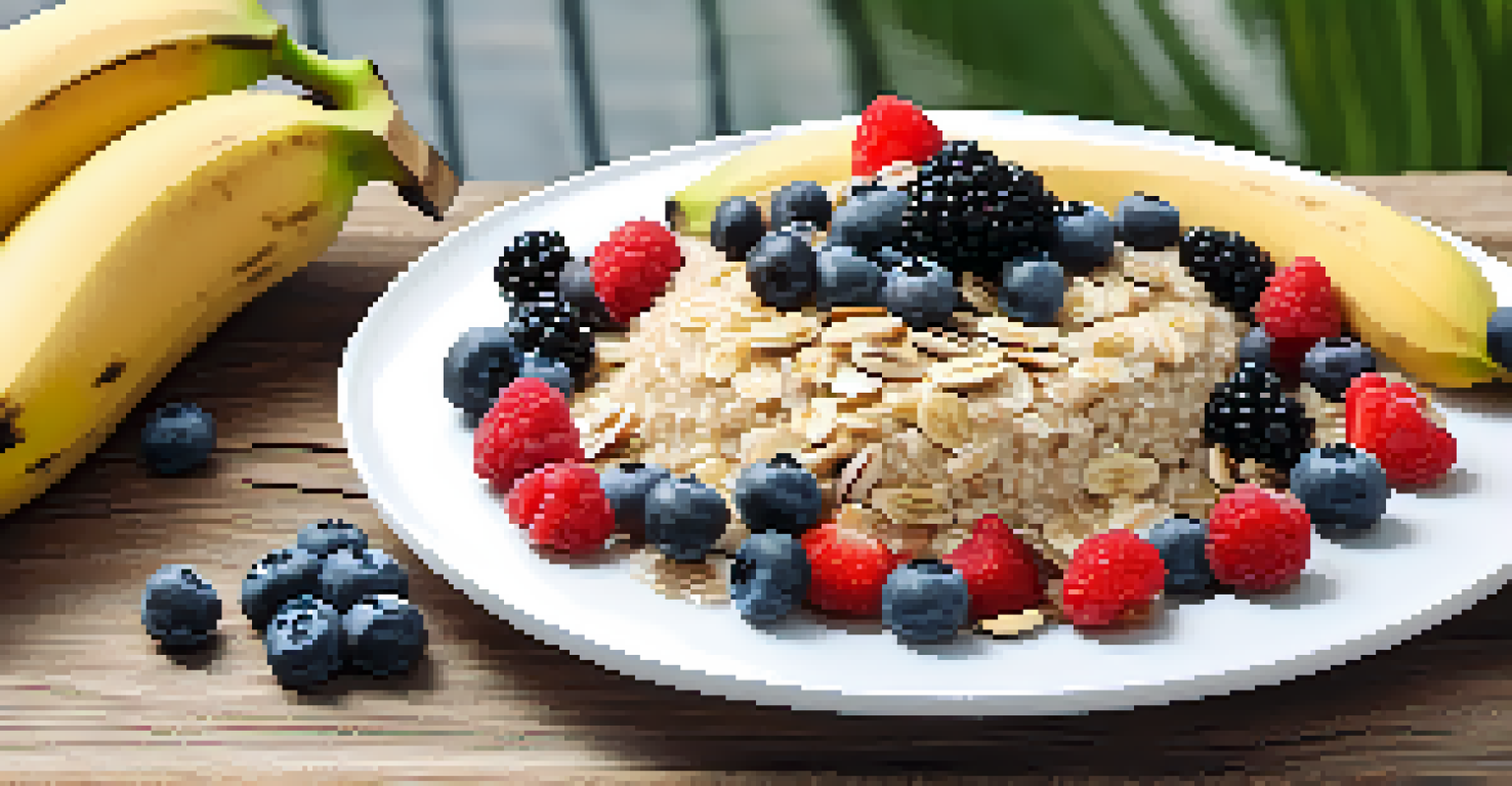Nutrition and Diet Considerations for Older Adults

Understanding Nutritional Needs as We Age
As we get older, our bodies undergo various changes that affect nutritional needs. Metabolism slows down, making it essential to focus on nutrient-dense foods rather than simply cutting calories. Older adults may require fewer calories but still need ample vitamins and minerals to maintain health.
A healthy outside starts from the inside.
For example, calcium and vitamin D are crucial for bone health, while B vitamins play a vital role in energy production and cognitive function. Incorporating a variety of fruits, vegetables, whole grains, and lean proteins into meals can ensure that older adults meet their nutritional requirements.
Additionally, it’s important to stay hydrated, as the sense of thirst may diminish with age. Drinking enough fluids not only supports bodily functions but also helps prevent constipation and urinary tract infections.
Prioritizing Protein for Muscle Health
Protein is essential for everyone, but it becomes even more critical as we age. Muscle mass naturally declines with age, a process known as sarcopenia, which can lead to weakness and increased risk of falls. Consuming adequate protein can help preserve muscle strength and function.

Incorporating high-quality protein sources like lean meats, fish, eggs, dairy, legumes, and nuts into daily meals can make a significant difference. For instance, a breakfast with Greek yogurt topped with berries and nuts provides a great protein boost to start the day.
Prioritize Nutrient-Dense Foods
As metabolism slows with age, focusing on nutrient-dense foods is essential to meet the body's vitamin and mineral needs.
It's also beneficial to spread protein intake throughout the day rather than consuming it all at once. This strategy ensures that the body can effectively utilize the protein for muscle repair and maintenance.
Focusing on Fiber for Digestive Health
Fiber plays a vital role in maintaining digestive health, which can be a concern for many older adults. A diet rich in fiber helps prevent constipation, aids in digestion, and can even lower cholesterol levels. Incorporating both soluble and insoluble fiber is crucial for overall health.
You are what you eat, so don't be fast, cheap, easy, or fake.
Foods like whole grains, fruits, vegetables, legumes, and nuts are excellent sources of fiber. For example, starting the day with oatmeal topped with fruit not only provides fiber but also important vitamins and minerals.
Additionally, staying hydrated is key when increasing fiber intake, as it helps the fiber do its job effectively. A well-balanced diet with adequate fiber can lead to better digestive health and overall well-being.
Balancing Carbohydrates for Energy
Carbohydrates are a primary source of energy, and it's important for older adults to choose the right types. Whole grains, fruits, and vegetables are excellent sources of complex carbohydrates that provide sustained energy while also delivering essential nutrients.
Refined carbohydrates, such as white bread and sugary snacks, can lead to energy spikes followed by crashes, which may affect mood and energy levels. Opting for whole grain options, like brown rice or quinoa, can help maintain steady blood sugar levels.
Embrace Protein for Muscle Health
Consuming adequate protein throughout the day helps preserve muscle mass and strength, reducing the risk of falls.
Including a variety of colorful fruits and vegetables in meals not only adds flavor but also ensures a rich supply of vitamins, minerals, and antioxidants, which are vital for overall health and energy.
The Importance of Healthy Fats
Healthy fats are essential for brain health and overall well-being, especially in older adults. Omega-3 fatty acids, found in fish, walnuts, and flaxseeds, are known for their anti-inflammatory properties and can support heart and brain health.
Avocados, olive oil, and nuts are great sources of monounsaturated fats, which can help lower bad cholesterol levels. Incorporating these fats into meals can enhance flavor and provide essential nutrients without excessive calories.
It's important to limit saturated and trans fats, often found in processed foods and fatty cuts of meat, as they can negatively affect heart health. Striving for a balance of healthy fats in the diet can promote better health and longevity.
Stay Hydrated for Optimal Health
Staying hydrated is crucial for everyone, but older adults are particularly at risk for dehydration. As we age, our bodies may not signal thirst as effectively, leading to inadequate fluid intake. This can result in various health issues, including urinary tract infections and kidney problems.
Encouraging regular fluid intake, even when not thirsty, is key. Water is the best choice, but herbal teas, broths, and water-rich fruits and vegetables can also contribute to hydration.
Stay Hydrated for Overall Wellness
Older adults must prioritize hydration, as diminished thirst signals can lead to dehydration and related health issues.
Making hydration a priority can improve cognitive function, energy levels, and overall health. Simple strategies, like keeping a water bottle nearby or setting reminders to drink, can help ensure that older adults stay adequately hydrated.
Mindful Eating for Health and Enjoyment
Mindful eating is a practice that encourages awareness of the eating experience, promoting healthier choices and enjoyment of food. For older adults, taking the time to savor meals can enhance the overall eating experience and encourage better digestion.
This approach involves paying attention to hunger cues, eating slowly, and appreciating the flavors and textures of food. It can also help prevent overeating and encourage more thoughtful meal planning.

Engaging in social meals with family and friends can further enhance the experience, making mealtimes more enjoyable and contributing to emotional well-being. Mindful eating fosters a positive relationship with food, which is essential for maintaining health in older age.